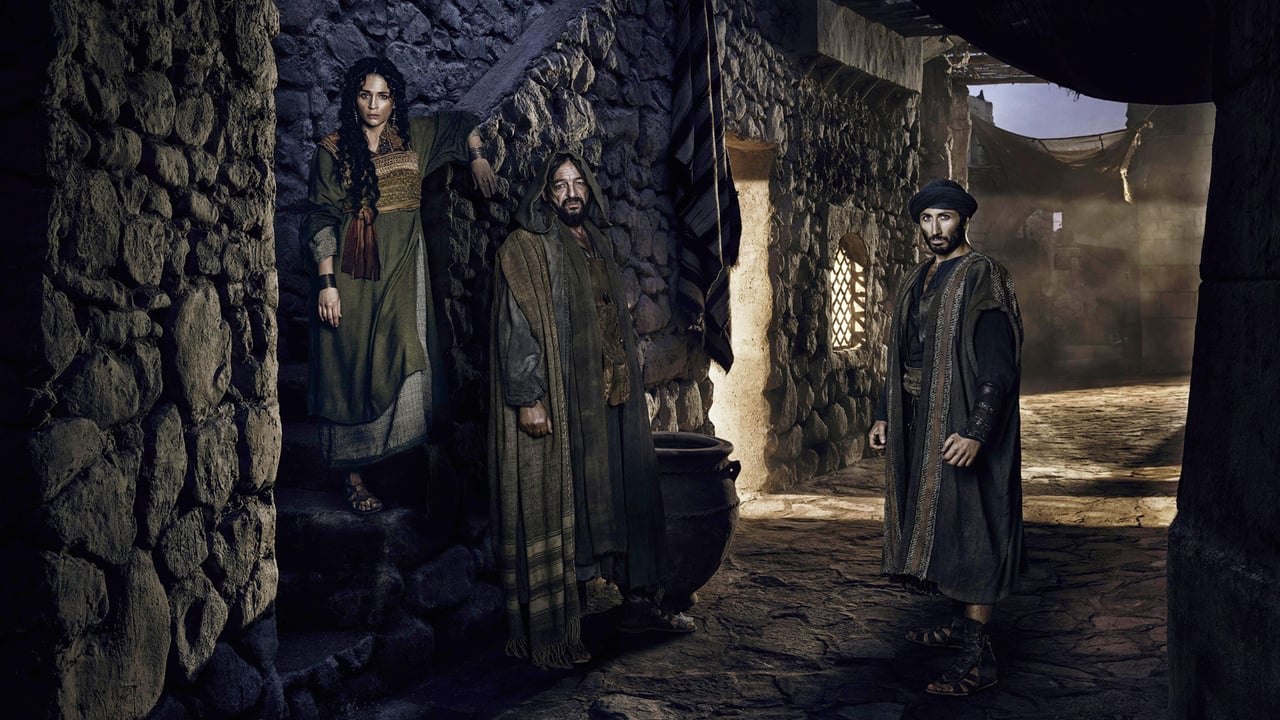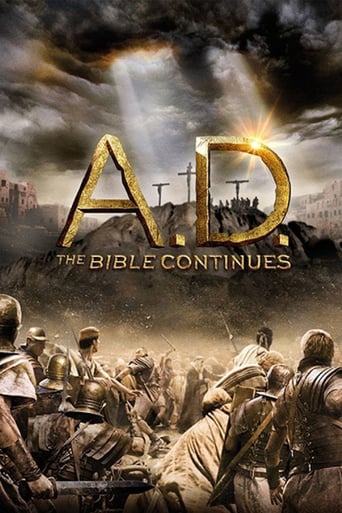BroadcastChic
Excellent, a Must See
Zlatica
One of the worst ways to make a cult movie is to set out to make a cult movie.
Jemima
It's a movie as timely as it is provocative and amazingly, for much of its running time, it is weirdly funny.
Cody
One of the best movies of the year! Incredible from the beginning to the end.
dierregi
A series about the events immediately after the crucifixion sounded daring and interesting, since there are way too many cinematic stories about everything that happened "before" and "during".I was therefore intrigued by the first episode and curious to see how the apostles were going to regroup. But episode after episode, I found the story unfolding in a most irritating way.Here we go with the usual brutal Roman repression (see Nazi in occupied countries or the evil empire) and Jewish plotting (don't even need to write more about that).The apostles seem stubborn, directionless, incapable of actually preaching anything that makes sense and still able to gather followers. Enter Saul and the show sort of pick up a bit, just to crumble miserably with the arrival of Caligula. History tells us that Caligula became emperor in 37 BC and did not start losing it until the following year. But the show needed the usual OTT villain and who better than the Roman emperor arriving in Jerusalem in 33 BC?On the other hand, if they just want to re-write history, why using episodes from the gospel? I refer especially to the very controversial one with Ananias and Sapphira. In this episode, an elderly couple sells a piece of land and gives part of the profit to the Christians to be allowed to live with them.However, they lie when they say they gave all the money, as they kept some aside just in case. But the holy spirit acts as a ruthless robber: "Give me ALL your money or I kill you" and the couple dies a horrible death for having dared keeping a little money aside (... actually.... maybe it was for lying, but it does seems a disproportionate punishment).Not the most endearing, loving statement from the newborn Christian movement...I am not surprised there was no a second series, since this one was bad in so many way...
martinbrygger
THE BIBLE CONTINUES deals with the period after the death and resurrection of Jesus. Most notably we meet Saul (who is later baptized as Paul) and Peter who spreads the message of Jesus. I think the series seems less professional compared to first series THE BIBLE but it is still worth watching. I agree with most other user reviews that the cast is not as good in THE BIBLE CONTINUES. Also the teaching of Jesus seems rather thin and superficial. I find myself siding with the Romans in the series sometimes and at times the Christians seem delusional and crazy. I believe the series should have focused more on the teachings of Jesus instead of only the history. However, I learned much from this series about the characters in THE BIBLE (the book). So I believe that most Christians or just historically interested will enjoy the series. Also I like that the series challenges the stereotypes of Jesus and Mary in appearance - Jesus has dark hair and Mary (the disciple) is colored.
robertemerald
I'm not immune to criticisms about this show being historically inaccurate. The heart of the problem between Rome and Jerusalem was always the Temple however, and in this the show captures something of the times with Caiaphas and Herod Antipas attempting to be good Roman subjects yet devoted to the Temple at the same time. I think the problem was fundamentally that Romans saw Temples as, well, temples, and the Jewish people saw the Temple as the essential church. This is, ironically, Jesus's problem with the Temple as well, knowing God to be everywhere. The show also, I think, gives us a good idea of the itinerant nature of the poor at that time, the various rivalries between factions, how dangerous it was to be out of favor at that time, and overall just how the city looked. A bustling Jerusalem has been created with some great aerial shot 3D to add authenticity. I get that the show is a tad politically correct as well, but there are so many very authentic touches, such as Roman horns announcing crucifixions or Caiaphas's purification baths or the attention given to costumes, that I tend to forgive this, although I found the depiction of the angel to be a tad warlike for me.And I was moved! Many times during this show I found myself closer to Jesus's message. Overall this show filled my heart with joy. I really liked watching it. I thought the cast, script and, yes, even the plot, to be totally engaging. Before I watched this show I didn't realize how much history happens with the disciples after Jesus goes to Heaven, and that's a very welcome eye-opener to me. This is good television and I definitely recommend this show.
Lammasuswatch
I am amazed at the number of people writing these reviews who seem to think that the Roman Prefect of Judea at the time of the Crucifixion of Jesus was a guy called "Pilot". This is somewhat worrying when many of them want to take every Bible word literally.The original miniseries "The Bible" was a bit of a joke. It tried to please scriptural literalists while simultaneously appealing to today's attention-deficit disordered viewers. So we ended up with a bizarre mix of "Hour of Power" with "Xena Warrior Princess", complete with obligatory sword-fights at 10-minute intervals. Of course, nothing could have prepared most viewers for the hilarity of the ninja angels. A master stroke of ironic witticism! Oh sorry, it wasn't irony, and the producers were being serious? Well, the good news is "The Bible Continues" has hosed down the Hollywooditis and used some very good actors and a much more believable storyline. They have done some serious research into biblical history, archaeology and textual criticism. It hasn't always come out authentically, but it's a pretty valiant effort. Sure, there are again characters and situations created purely for dramatic effect. But at least with this effort - supposed to be a sequel to the original miniseries and based around the Book of Acts - I am not finding myself continually doubled over with the laughter of pure disbelief at what's happening on screen.All the principal characters of this new visitation are believable psychologically, and for the most part historically. (That is, as far as we know, given that we actually know very little or nothing at all of actual historical merit about most of them).I thought it might have added some dramatic interest to have the resurrected Jesus never actually appear on screen, so the viewer is left in the same boat as those to whom the disciples were preaching. Have these people been seeing or imagining things, or did something amazing actually happen? The producers do hint at this approach upon Saul's conversion later in the series, but clearly the series message regarding an actual physical resurrection of Jesus tolerates no doubt. So, in the first episode we see all the magic of the resurrection, complete with bright heavenly light shows and Angel warriors. (But thankfully, with everybody no longer kung-fu fighting!) Pontius Pilate (or, sorry, should that be "Pilot"?) is accurately portrayed for a change, at least in personality and competence, if not in actual events. The role of Pilate and the Romans in the death of Jesus, whitewashed by the romanized Church after Constantine, is largely corrected here. This puts the storyline roughly in line with the history of the romano-Jewish historian Josephus. He was writing at about the same time as the first three Gospels were being written (anywhere between A.D. 65-95, although Paul was probably writing his Epistles as early as A.D. 50).Vincent Regan's Pilate is certainly capricious and often a poor judge of sensible courses of action. Josephus writes that Pilate had a reputation for offending his subjects' religious sensibilities, and his suppression of a Samaritan uprising was so harsh that he was recalled to Rome in AD 36. The rash of petty crucifixions after an attempted assassination depicted in this miniseries is probably a loss of control and common sense even the historical Pilate would never have countenanced. But the idea that he agonized over the death of an innocent man - washing his hands of all responsibility - is not a picture in keeping with the historical Pilate, who would never have hesitated nor had a moment's regret in executing anyone he deemed a danger to Rome's authority. This miniseries got that right.There are other liberties taken with historical fact. The decision to have Emperor Tiberius and soon-to-be Emperor Caligula visit Pilate in Jerusalem is puzzling. Neither of these Emperors visited Judea - and certainly not together. For the last ten years of his life, Tiberius could hardly be coaxed away from his Isle of Capri pleasure retreat even to visit the Italian mainland, much less the insignificant province of Judea! And while there was a rumour that Tiberius was smothered by a pillow, and that Caligula arranged it, it certainly didn't happen in the Holy Land. But the big question is, what does this fictional plot line add to the story besides two extra episodes and a black mark in the authenticity column? And what does it do for those poor souls who desperately want to view this series as a televised authentic-history Bible Study, who are surely its main audience? There are, however, many things this miniseries handles very impressively - particularly the depiction of the politics, the cultural practices and clashes, and the atmosphere of 1st Century Judea. High Priest Caiaphas is not the complete villain we know from the scriptures, but (as portrayed very convincingly by Richard Coyle) principally a diplomat walking a tightrope in trying to balance his role defending his Temple and Faith along with the safety of his people against the naked brutality of the Roman occupiers. Fascinating to watch also are the different viewpoints and priorities of the followers of Jesus: from the zealot-oriented Simon; through the two leaders of Judaic Christianity, Peter and James the Just, and their different approaches to spreading the word; balanced against the fanatical persecution, then the fanatical participation of the converted Saul. The Saul we have here (depicted by Emmett Scanlan) - mercurial, ultra-opinionated and just as dangerous when he is for Jesus as he was when against him - is one interpretation of this Apostle's possible personality garnered from careful textual analysis. It shows excellent research and more than a bit of daring, since Paul is one of the great Christian heroes.And on top of all this, we have a Pilate - or should that be Pilot? - flying straight and true for a change! What more could you ask?

